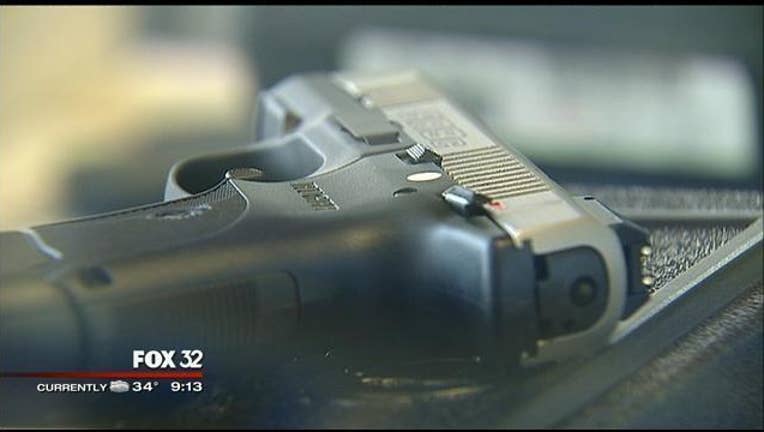Illinois bills would limit mentally ill from owning guns

SPRINGFIELD, Ill. (AP) - Illinois' ability to keep guns out of the hands of people who are mentally ill or pose a danger would be strengthened under several proposals in the General Assembly, but the ideas have raised concerns among gun rights advocates.
Some of the Democrat-sponsored plans would remove a person's right to hold a Firearm Owners Identification card, which is necessary to purchase a gun in Illinois, if the individual has an order of protection against him or her or if a family member successfully petitions a court. Another plan would require better reporting of cases in which a judge has deemed someone mentally disabled.
Each measure tightens a loophole in existing law, which some lawmakers said could prevent more gun deaths and keep potentially dangerous people from possessing firearms. But some gun rights advocates say a couple of the plans are too severe and that stricter gun laws disregard the rights of responsible gun owners.
MENTAL ILLNESS AND GUNS
Eighty percent of people considering suicide and over half the number of mass shooters in the past two decades reportedly showed signs of mental illness before an incident occurred, according to the Illinois Council Against Handgun Violence. A 2013 report by the Centers for Disease Control and Prevention showed gun suicides in Illinois increased from 490 to 496 between 2012 and 2013.
"People have critical moments in their lives where things aren't easy. Removing guns can save lives," said Colleen Daley, executive director of the Illinois Council Against Handgun Violence.
SUSPENDING ABILITY TO PURCHASE FIREARMS TEMPORARILY
A measure awaiting House consideration would temporarily suspend a person's ability to purchase firearms for up to one year if a relative or someone the individual lived with filed a petition with a circuit court saying the person could be a danger to himself or herself and others. The bill's sponsor, Democratic Rep. Kathleen Willis, of Addison, said her proposal is a response to the number of mass shootings and suicide deaths.
But Illinois State Rifle Association Executive Director Richard Pearson said anyone in a person's household could complain, easily taking advantage of the measure. Some Republican lawmakers said the measure is government overreach. Willis said a perjury clause in her plan could prevent false accusations, adding that her bill also would allow a person to petition the court to have a suspension repealed.
A person may get his or her gun owner identification card back after reapplying within five years of having the card revoked under current policy. A doctor also must testify in court that the individual is competent enough to have a gun owner's license.
ORDER OF PROTECTION LIMITATIONS
A measure awaiting Senate consideration would require state police to notify local law enforcement when a person has an order of protection against him or her, so those officers can assist in revoking an individual's gun owner identification. The full House has approved the plan by Democratic Rep. Kelly Cassidy, of Chicago.
Cassidy said her plan could prevent stalkers from owning and possessing firearms.
But Pearson, the State Rifle Association leader, said orders of protection are hard to substantiate when it's one person's word against another.
Temporary orders of protection can last up to two years, with a chance of renewal, or a judge may grant a permanent one. Current policy requires state police to revoke the gun owner identification card of a person who has an order of protection against him or her, giving an individual 48 hours to turn over firearms to local law enforcement or a licensed relative.
KEEPING BETTER RECORDS
A proposal heading to the House would strengthen existing law by requiring circuit court clerks to report the total number of people a judge deemed mentally ill to the Illinois State Police at least twice a year. The full Senate approved the proposal by Democratic Sen. Julie Morrison, of Deerfield. Under the measure, a person could lose his or her gun owner identification card by state law.
Morrison said her plan would ensure that all counties in the state report all of their residents who are mentally ill.
The State Rifle Association has no stance on Morrison's plan.
"This is a good check and balance," Morrison said, adding that her idea would create better communication between circuit courts and state police.

